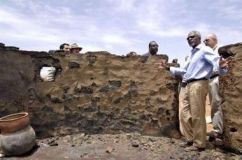UN’s Annan visits burned-out town in Sudan’s Darfur
By Opheera McDoom
LABADO, Sudan, May 28 (Reuters) – U.N. chief Kofi Annan toured a refugee camp and a burned town in Darfur on Saturday, hearing calls for African troops to play a bigger role in protecting those living in the troubled region of Sudan.

|
|
U.N. Secretary-General Kofi Annan visits a burnt out mud hut in the town of Labado in south Darfur May 28, 2005 after it was abandoned by its 60,000 inhabitants when it was attacked in December 2004. (Reuters). |
Thousands of refugees welcomed the U.N. secretary-general in Kalma Camp, the biggest in Darfur, before he travelled to Labado, also in South Darfur state, to wander among burned huts and speak to worried owners who have started returning home.
“Now we are back but still we don’t have security and we feel unsafe,” Murra Ahmed told Annan after she described how five government planes had bombed Labado and driven her out.
South Darfur state has seen some of the worst recent violence in a three-year conflict the United Nations says has killed tens of thousands and forced 2 million from their homes.
African Union (AU) commander in Labado, Colonel Mohamed, briefed Annan and his delegation on the attack on December 17 that set Labado ablaze and killed 105 people.
AU monitors verified that there was a government bombardment of Labado. The government has not disputed the finding.
Mohamed, who did not give his full name, said he wanted an expanded mandate for the AU from its present monitoring force with limited powers to protect civilians, to full peacekeeping status.
For now, the more than 2,300 AU troops are to protect the military observers in the troubled region. Hundreds of civilian police are also being deployed to the refugee camps.
“We don’t need protection for the military observers, we need to protect the civilians,” Mohamed told Reuters after the briefing. “We need a peacekeeping mandate.”
Annan said: “I was very pleased to hear the local commander say that we need an expansion of the mandate … That to me is a clear indication of a commander who knows what he is here to do.”
LOOKING FOR JUSTICE
Rwanda said on Saturday it would send an additional 1,500 troops to Darfur to join the about 390 it already has on the ground. The troops will be part of an expansion of the AU force to about 12,000 by spring 2006.
About half the 60,000 people who lived in Labado have gone back to their ruined homes since the AU set up bases there. But the residents want bigger AU role to secure their future.
“Just a week ago they burned a village not three km (two miles) from here. The AU could see them coming,” said Juma’a Eissa, one of the residents. “But they didn’t stop it, they just made a report.”
In Kalma camp, men waved signs saying “We are looking for freedom and justice” and women ululated to welcome the U.N. chief almost 11 months after his first visit to Darfur.
Refugees complained about police and Arab militias who they said had attacked, killed and raped their families in the camp. Annan also talked to female rape victims, one of whom was a prepubescent, in a reed hut guarded by AU troops.
A report by aid group Medecins Sans Frontieres in March said about 500 women or more had been raped in recent months and said their attackers were militiamen or soldiers. Khartoum denies widespread rape in Darfur.
Aid workers told Annan their organisations continued to suffer problems getting aid to the displaced in Kalma but the presence of AU police in the camp had helped.
The aid workers said the Darfur emergency presented an extra challenge because insecurity rendered many areas out of reach. Donors needed to keep funds flowing for what the aid workers saw as “a long stretch ahead”.
The leader of the Darfur rebel Sudan Liberation Movement said the situation of the refugees was particularly serious with the onset of rains that disrupt transport.
“I call on the United Nations and the secretary-general to take urgent and decisive steps to protect and return the displaced to their original homes and villages,” Abdel Wahed Mohamed al-Nur told Reuters by telephone.
(Additional reporting by Edmund Blair in Cairo)
